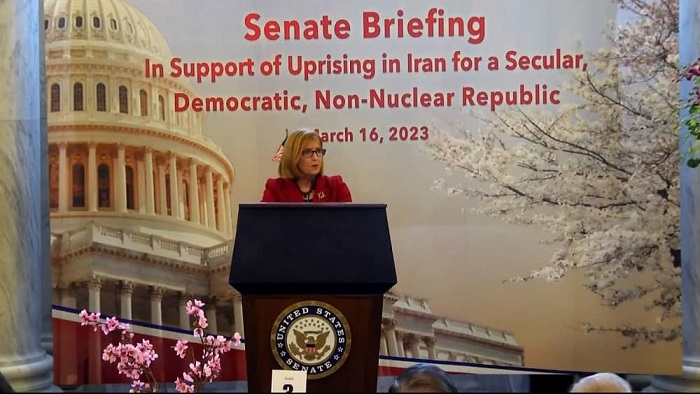
She urged everyone to give their full support to the brave men and women fighting for their freedom and the freedom of future generations in a democratic, secular, non-nuclear Iran republic.
In her remarks, Ambassador Dobriansky first acknowledged the Nowruz holiday, which has been observed by Iranians for over 3000 years and marks the arrival of Spring. She mentioned that in 2009, UNESCO included the holiday on its representative list of humanity’s intangible cultural heritage, recognizing that it promotes values such as peace, solidarity, and reconciliation.
Ambassador Dobriansky then focused on Iran’s women and daughters, specifically on the case of Mahsa Jina Amini, a 22-year-old Iranian woman who was arrested by Iran’s so-called morality police for allegedly wearing her hijab in a way that exposed some of her hair. She was beaten brutally and repeatedly by police while in custody before collapsing and dying.
The brutal killing of Mahsa sparked months of grassroots, women-led protests across Iran’s 31 provinces, which were met with a violent police response. According to Amnesty International, hundreds of peaceful protesters, including approximately 70 children, were slaughtered. This, as per Ambassador Dobriansky, is state-sponsored violence against women, which has a long history in Iran. However, Mahsa’s murder struck a nerve in Iranian society, sparking a protest movement that is still going on today.
During her speech, Ambassador Dobriansky emphasized the ongoing violence against Iranian women and the importance of putting an end to it. She reminded the audience that the UN Economic and Social Council ECOSOC voted 29 to eight in favor, eight against, and 16 abstention to remove Iran from the Commission on the Status of Women. She also mentioned that in 2021, the UN Special Rapporteur on Human Rights in Iran reported that almost all executions in the country constituted an arbitrary deprivation of life.
According to Amnesty International, the regime executed at least 94 people in January and February alone, amid horrific sexual violence and other allegations of torture. There has been a significant increase in executions compared to the same time last year, and there have been numerous reports in recent days about the poisoning of Iranian schoolgirls.
Ambassador Dobriansky discussed the ongoing protests in Iran and the need for all governments around the world to take diplomatic, economic, and symbolic measures to punish the regime while also supporting the protesters. Mrs. Maryam Rajavi’s ten-point plan, which calls for freedom of expression, assembly, religion, and the right to choose their own leaders, was highlighted.
She urged the international community to support the Iranian people in their fight for democracy and basic human rights.

MEK Iran (follow us on Twitter and Facebook), Maryam Rajavi’s on her site, Twitter & Facebook, NCRI (Twitter & Facebook), and People’s Mojahedin Organization of Iran – MEK IRAN – YouTu







